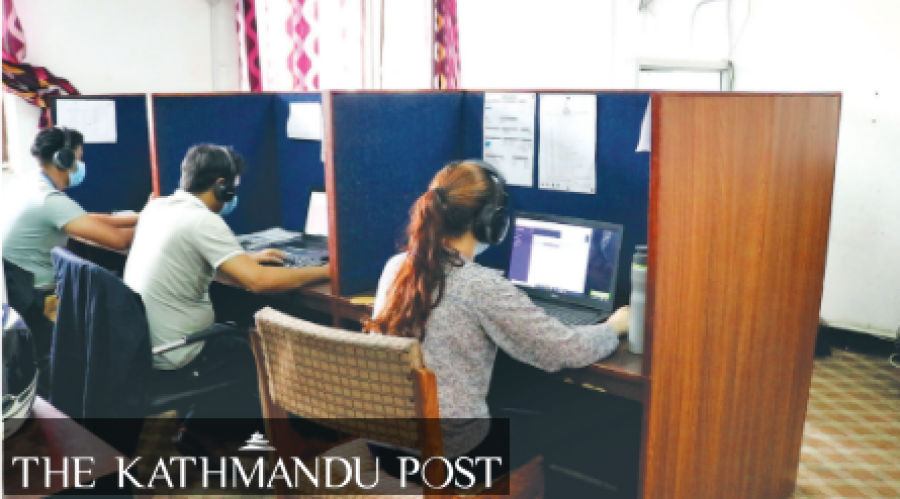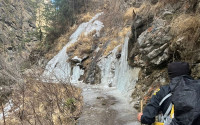National
At Covid-19 call centre, most of the queries of late are about vaccines
Operators say though they are troubled by some prank calls, the overwhelming number of people asking about jabs is an encouraging sign that Nepalis are up for the shots.
Anup Ojha
At the coronavirus call centre set up on the second floor of the Epidemiology and Disease Control Division at Teku, phones ring constantly. From six in the morning to ten at night, operators deal with a flurry of questions, mostly regarding Covid-19 vaccines.
“Ever since the immunisation drive was launched in late January, over 60 percent of our callers have been asking when and where they can get the vaccine,” said Amrit Dhakal, 30, who has been working at the call centre for the past one year.
On average, he handles over 80 calls from across the country daily, he said.
The government established the call centre on March 13 last year in coordination with the World Health Organisation to disseminate information about the coronavirus. In the initial days, it was operated from Jawalakhel and the government had outsourced the service. But a month later it was shifted to Teku.
The hotline number 1115 is open from 6am to 10pm, and a total of 12 staff run the call centre in two shifts.
“Over the past three days, most of the calls are from vaccinated people who want to know how to get the immunisation certification,” Dhakal told the Post on Thursday afternoon, as hundreds of Nepali migrant workers were jostling in queues to get the vaccination certification braving a heavy July rain.
According to the operators, in the initial days, people used to call to know about the coronavirus and ways to be safe. But after the government’s vaccination campaign faced a hitch for a lack of vaccines, the number of calls suddenly grew, with people asking when they could get vaccinated.
When vaccines started to arrive, people now want to know where and when vaccines are being administered and which types of vaccines are being given to the people, a call operator said.
“The overwhelming number of calls from people asking where they can get vaccinated shows their acceptance of the jabs,” said the 27-year-old who did not wish to be named.
She said she has been working at the centre for the last three months.
After starting with Covishield, the AstraZeneca type vaccine manufactured by the Serum Institute of India, Nepal so far has used Vero Cell, manufactured by China’s Sinopharm, and the Janssen vaccine developed by the US firm Johnson & Johnson.
Ashesh Regmi, a senior public health officer at the Epidemiology and Disease Control Division who is also the in-charge of the call centre, says the calls they receive can be divided into three categories–genuine concerns, rumours they have heard and prank calls.
“Some concerns are indeed genuine, as people ask if pregnant women can be vaccinated, if two different types of vaccines can be mixed and if people below 18 years can be vaccinated,” Regmi told the Post. “We provide answers to our callers as per the World Health Organisation’s guidelines and facts based on scientific research.”
The walls of their cubicles are covered with A4 sheets on which answers to commonly asked questions are written to make it easier for them to respond quickly.
The operators are lab technicians, public health graduates, health assistants, nurses, and those with a background in microbiology. They take details of every caller–name, address and question asked–and feed the information into the computer database.
Some common queries are then sent to the National Health Education Information Communication Centre under the Health Ministry so that posters and pamphlets and videos can be made for awareness campaigns.
Dr Basudev Pandey, former director of the Epidemiology and Disease Control Division, said that people’s queries regarding vaccines as to when and where they can get inoculated is an encouraging sign, which shows vaccine hesitancy is minimal in Nepal.
“If people are asking about safety, that’s a given,” said Pandey. “We have not developed or manufactured any vaccine in Nepal and the jabs we are using were brought from abroad. It’s natural for people to ask if these vaccines are safe. Our duty is to inform the people.”
Given Nepal’s high vaccine acceptance rate, most of the people would have been vaccinated by now if the government had been able to arrange for enough vaccines.
So far, only 4 percent of the 30 million population have been fully vaccinated.
A research conducted by the Centre for the Study of Labour and Mobility, in collaboration with the US-based Yale University, shows that 97 percent of Nepali population who are eligible for vaccines are ready to take the jabs.
Even though the vaccination campaign has resumed with more doses arriving in recent days, Nepal has not been able to secure AstraZeneca jabs to give booster doses to the over 65 age group who took their first shots in the second week of March.
“Every day, we receive over a dozen calls from people asking about the second dose,” said the nurse at the call centre, who did not wish to be named. “People also ask if there are any side effects of the vaccine.”
According to her, when the government started administering the Johnson & Johnson vaccine provided by the United States of America, from Monday, people started inquiring about the criteria to get the vaccine.
Data from the Epidemiology and Disease Control Division show the call centre has received 300,000 phone calls so far.
“In the past six months 7,100 calls were related to vaccines,” said Regmi, the call centre in charge.
But all is not well in a day’s work for these operators.
Some of the callers ask outrageous questions, they say, like if drinking alcohol or cow urine or smearing one’s body with cow dung would help cure Covid-19.
“There are some bored callers who call for fun,” said Dhakal, one of the operators who is a lab technician. “Everyday, I attend over a dozen prank calls, and some of them ask if we could top up their mobile phones. There are some angry callers who vent their ire randomly for no particular reason.”
Dhakal says at times it does get frustrating but everyone knows what their duty is so they don’t react to such nuisance calls.
In recent days, the call centre has also started blocking some repeat troublemakers who frequently call for fun rather than for genuine information.
Regmi, the call centre in charge, said some genuine calls, which are technical and whose answers the operators cannot provide, are forwarded to 1156, the hotline number of the Nepal Medical Association.
“The hotline number has been set up to disseminate fact-based information to the public as misinformation is widespread these days,” said Regmi. “Our job is to provide accurate information related to the coronavirus and vaccines based on facts and WHO guidelines.”




 11.84°C Kathmandu
11.84°C Kathmandu.jpg)













